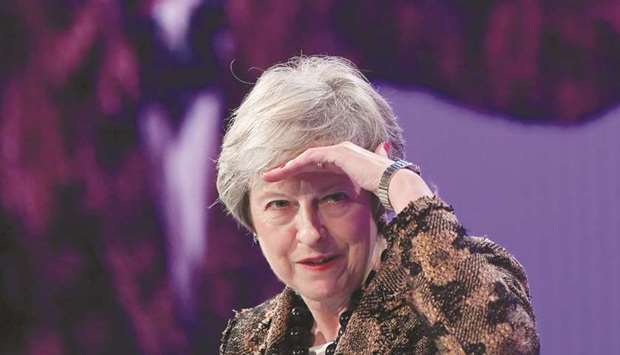Theresa May has told business leaders she will “unashamedly” put the economic success of the UK and the livelihoods of “real people” first as she battles to bring her mutinous Tory backbenchers to heel over her Brexit plans.
The prime minister warned Conservative MPs threatening to bring down her leadership that Brexit was not just an exercise in “political theory” as she battled to seize back the initiative from hostile Eurosceptics.
Her efforts to keep control of her restless party were boosted when the Foreign Secretary, Jeremy Hunt, speaking on a trip to Iran, said MPs seeking to oust May risked “the most appalling chaos” that could destabilise the country and even prevent Brexit.
“When people think about this, they will realise that backing her is the right thing to do.”
In a defiant speech to business leaders at the CBI conference in London, May vowed to press ahead with her Brexit plans despite attempts to force the government to renegotiate with Brussels.
“It was never going to be easy or straightforward and the final stage was always going to be the toughest,” she said.
“But we have in view a deal that will work for the UK. And let no one be in any doubt – I am determined to deliver it.”
As she began perhaps the most perilous week of her premiership, May urged voters not just to “listen to politicians” but also to businesses providing jobs that “put food on the table for your family” and which have been supportive of her plans.
“We are not talking about political theory, but the reality of people’s lives and livelihoods. Jobs depend on us getting this right. What we have agreed unashamedly puts our future economic success, and the livelihoods of working families up and down this country, first.”
However, May angered Tory Brexiters by signalling that the end of the Brexit transition period could be extended from December 2020 to the next general election, due in June 2022, with the extra payments and free movement that would involve.
The EU’s chief negotiator, Michel Barnier, has said Brussels is open to an extension to December 2022, but May said: “It is important in delivering for the British people that we are out of the implementation period before the next general election.”
Carolyn Fairbairn, the CBI’s director general, said May’s deal was significantly better than “stepping off that cliff” of no-deal Brexit next March, adding that plans for a future trade deal at least charted the route to frictionless trade with the EU.
She had harsh words for Tory rebels threatening to vote down May’s deal. “Our firms are spending hundreds of millions of pounds preparing for the worst case – and not one penny of it will create new jobs or new products,” she said. “While other countries are forging a competitive future, Westminster seems to be living in its own narrow world, in which extreme positions are being allowed to dominate.” However, she criticised May over her plans to curb immigration after Brexit – a central demand of voters at the 2016 referendum – and suggested the new system would stop EU workers being able to “jump the queue” over those from outside Europe.
“Government may be listening to business when it comes to immigration, but they still aren’t hearing,” said Fairbairn. “The best way to build public confidence is through a migration system based on contribution, not numbers.”
May told the business leaders they must “play their part” in creating a successful post-Brexit Britain, stressing their essential role once her final deal was agreed. “It’s not just a job for politicians,” she said.
Meanwhile, on a trip to Tehran, Hunt told the Guardian: “May has perhaps got the most difficult job of any prime minister or president in the western world at the moment. Somehow she has to find a way of navigating the shoals of Brexit in a way that allows us to have national closure on the issue and move on and deal with all the other issues we face. That means leaving the EU, but with a friendly trading relationship, and a friendly relationship at all levels.”

Prime Minister Theresa May replies to questions after speaking at the Confederation of British Industry’s (CBI) annual conference in London yesterday.
